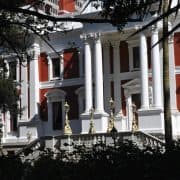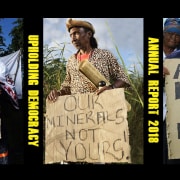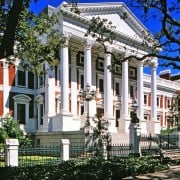|
Getting your Trinity Audio player ready...
|
By Mavuso Msimang
First published in City Press
“O tempora! O mores!” Attributed to Cicero, the illustrious Roman philosopher and statesman who was greatly admired for his humanism, this lament literally translates into “Oh the times! Oh the customs!” It couldn’t be more appropriate for South Africa today.
Cicero was commenting on the viciousness and corruption of his era. The object of his frustration was that, despite all the evidence that had been compiled against him, Catiline, who had been accused of conspiring against the government, had not yet been executed.
Now, the South African Constitution does not permit the execution of a human being, no matter the severity of the crime committed. But, like Cicero, South Africans have at times been deeply troubled by the lack of action on the part of institutions responsible for the prosecution of persons involved in treasonable activities. They have helplessly witnessed state capture and industrial scale corruption perpetrated with impunity.
Paul Collier, professor of economics and public policy in the Blavatnik School of Government at the University of Oxford, has written extensively on the subject of corruption. He distinguishes between the type of corruption that he describes as damaging, and that which is debilitating.
He posits that for any society to lift itself out of absolute poverty it needs to build three critical institutions, namely, those responsible for taxation, law and security. Attacking or undermining these institutions through corruption can bring a nation to its knees.
Collier states that a society that has no capacity to tax simply cannot build and sustain a meaningful state. “Once the state starts getting tax revenue, it has the incentive to grow the economy.”
The second critical institution is one that has the responsibility of upholding the rule of law. Once this capacity is eroded, “there is no sanctity of contract or property, and so investment and trade are paltry”. Thirdly, where there is no security, lawlessness prevails and “people protect themselves by not accumulating assets, or by pre-emptive violence”.
Collier observes grimly that, in the absence of these three capacities, “life is nasty, brutish and short”.
Pillars of SA democracy under fire
In the past several years, South Africans have experienced a determined onslaught on key institutions that hold up the pillars of our democracy, namely the South African Revenue Service (Sars) and the National Treasury; the National Prosecuting Authority (NPA); and the South African Police Service (SAPS) and the Directorate for Priority Crime Investigation (Hawks).
Over the years Sars and the National Treasury had built up an admirable, world-class reputation for work performance. As its commissioner, Pravin Gordhan turned Sars from a mediocre institution into one that performed outstanding revenue collection. Similarly, the National Treasury was globally recognised as an excellent institution, indisputably the best-run department in the national government.
These two institutions became a prime target for control by forces bent on looting state resources.
When Tom Moyane was appointed commissioner of Sars, he immediately focused his attention on Sars’ crack crime-busting unit that Gordhan had established, the National Research Group (NRG), which was responsible for high risk investigations. It dealt with money launderers, tobacco smugglers, organised criminals and even assassins, all of whom were involved in tax evasion.
In the course of duty, the NRG had recovered millions of rands of evaded taxes and exposed massive corruption, some of which implicated high-profile politicians and their associates.
The media played into the hands of the people who were bent on discrediting Sars professionals and ran front-page stories alleging that the NRG was a rogue unit that spied on then president Jacob Zuma and other prominent ANC officials.
With Moyane at the helm and over 55 senior managers having left Sars, tax collections took a dive, the latest having a R50bn shortfall. This has resulted in the raising of value-added tax from 14% to 15%. Needless to say, this hits the poor the hardest. Reports indicate that the disbanded NRG had conducted extensive audits and was ready to swoop on targeted tax evaders who collectively owed Sars some R2bn.
The consequences of the destabilisation of the National Treasury have been low investor confidence, stagnant economic growth, the downgrading of South Africa’s sovereign bonds to subinvestment grade, unprecedentedly high unemployment rates and increasing poverty. And so, the first pillar fell.
Political interference undermines rule of law
During the last decade, Zuma’s interference in the running of the NPA and the continued appointments of unfit individuals to lead the institution resulted in the non-prosecution of serious corruption cases.
Individuals and institutions implicated in state capture and other nefarious activities have been left untouched, despite strong indications of wrongdoing.
Continuing litigation by opposition parties and civil society has attempted to force the NPA to act without fear, favour or prejudice and uphold the rule of law.
However, poor leadership has crippled the institution, which seems to have found its teeth only after the departure of Zuma. This has left the second pillar hanging on by only a slender thread.
The SAPS and the Hawks have also been notoriously reluctant to pursue corruption cases, especially those involving politically connected individuals.
Discredited officials have been appointed to lead these institutions, with some being implicated in criminal activities. The names of Richard Mdluli, Berning Ntlemeza and Khomotso Phahlane quickly come to mind. Small wonder criminals appear to act with a sense of impunity.
Despite the SAPS budget doubling during the last 10 years to just over R80-billion per annum, the performance of both the SAPS and the Hawks has declined. Poor police leadership has cost lives and has impacted on public safety.
In 2017 the level of lawlessness increased with evidence of wrongdoing continually emerging through the media about the extent of state capture. But none of our law enforcement institutions was willing to investigate the implicated individuals and bring criminals to justice. This reduced the third pillar to a state of virtual collapse.
Under the new administration, we must continue to put pressure on ensuring that the integrity of these three vital pillars is restored.
Failing that, the danger remains that corrupt officials will continue to abuse institutions that were set up with the intention of protecting the interests of the people.
Eternal vigilance is a price that we have to pay for our liberty.
• Mavuso Msimang is chairperson of Corruption Watch








